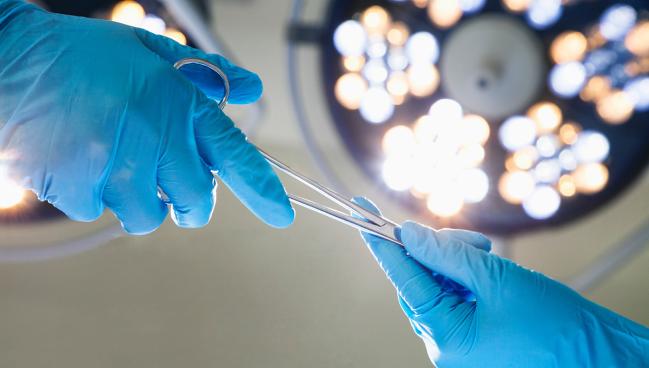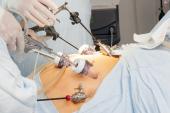Improved Lipids With Gastric Bypass Linked to Surgery Itself, Not Weight Loss
Caloric intake and weight loss can’t explain the reduction in LDL and apoB, suggesting the RYGB surgery itself is plays a role.

Gastric bypass surgery appears to reduce atherogenic blood lipids, including LDL cholesterol and apolipoprotein B (apoB), independent of weight loss and caloric restriction, according to a small, nonrandomized, controlled study.
Compared with patients who lost similar amounts of weight with diet alone, patients who underwent Roux-en-Y gastric bypass (RYGB) surgery and adhered to a similar diet had significantly lower non-HDL cholesterol, apoB, and lipoprotein(a) within 6 weeks.
Senior investigator Jøran Hjelmesæth, MD, PhD (Vestfold Hospital Trust, Tønsberg, Norway), said the study, which was published earlier this month in JAMA Surgery, was designed to determine whether the beneficial effects of gastric bypass surgery were attributable to the procedure, caloric restriction, or the resulting weight loss, something that had been unclear.
“Both caloric restriction and weight loss are beneficial for lowering blood pressure, lipid levels, blood glucose, and so on,” he told TCTMD. “Here, both groups had a similar kind of caloric restriction—less than 800 calories per day—and they had a similar weight loss during these 6 weeks. The beneficial effects on blood pressure and blood glucose were similar between the two groups, but the lipid-lowering effect was better after gastric bypass. I think that’s the first time this has been shown in an experimental study.”
A 2020 study comparing diet to gastric bypass surgery in patients with diabetes showed that improvements in metabolic function were explained by weight loss, said Hjelmesæth, and other prior research suggests that gastric bypass surgery can improve various lipid measurements. Those studies have typically not controlled for weight loss or calorie restriction, and many experts in this field have assumed that improvements in cardiovascular risk factors following gastric bypass surgery likely stem from weight loss.
The COCKTAIL Study
To determine the impact of surgery on atherogenic blood lipids, the researchers launched COCKTAIL, a study of 78 patients with severe obesity (mean age 47.5 years; 65% female) treated with gastric bypass or dietary interventions at a tertiary care center in Norway. Both groups—those assigned to RYGB plus a very-low-calorie diet or a very-low-calorie diet alone—were initially prescribed an intake of approximately 1,200 kcal/day for 3 weeks. At this point, the dietary group were treated with a very-low-calorie diet (approximately 800 kcal/day) while the surgical group underwent RYGB surgery plus the very-low-calorie diet.
During the first 3 weeks, body weight, fat mass, HbA1c levels, systolic blood pressure, and LDL cholesterol levels significantly improved in both study arms, with no significant differences seen between groups.
From week 3 to week 9—the study period—those who had RYGB lost more weight than those adhering to the very-low-calorie diet alone (mean between-group difference 2.3 kg), but the loss in fat mass was similar between groups. The change in fat-free mass was larger in the first 2 weeks after RYGB surgery, but this was likely attributable to dehydration, say researchers.
Total, LDL, and non-HDL cholesterol levels declined in the 6 weeks after RYGB but remained stable or increased slightly in those assigned to the very-low-calorie diet alone. The between-group difference in LDL cholesterol, for example, was -18.0 mg/dL. Similarly, apoB and lipoprotein(a) levels declined in the 6 weeks after surgery but weren’t altered by diet alone. The largest between-group difference in cholesterol levels was observed in the last 4 weeks following RYGB surgery (weeks 5-9), with similar changes seen in the first 2 weeks (weeks 3-5).
HDL cholesterol concentrations and fasting triglycerides were unchanged in either group, while there were improvements in HbA1c, insulin sensitivity, and blood pressure in those treated with diet and surgery plus diet.
Comparing Gastric Bypass to GLP-1s
In terms of why gastric bypass might facilitate an improvement in lipid parameters unexplained by weight loss, Hjelmesæth said he suspects that may be related to reduced absorption of free fatty acids into the intestinal tract. While gastric surgery is not advised for the sole purpose of lowering LDL cholesterol or other lipid parameters, the current study suggests that there are direct lipid effects of gastric bypass alone that may help explain the cardiovascular benefits of surgery, say researchers.
In an editorial, Leah Schoel, MD, and Dana Telem, MD, MPH (University of Michigan, Ann Arbor), wonder about the relevance of the study given how much the obesity field has changed. With the emergence of glucagon-like peptide-1 (GLP-1) receptor agonists, “medical weight-loss therapy is arguably the comparison group of interest.”
“As we navigate the integration of glucagon-like peptide-1 agonists and bariatric surgery as two pillars of multidisciplinary obesity treatment, a contemporary model should focus on evaluating the incremental versus independent benefits of each therapy,” they write. “If the benefits prove equivalent, studies should compare the cost-effectiveness and long-term sustainability of these interventions for weight loss and comorbidity management.”
Speaking with TCTMD, Hjelmesæth said the COCKTAIL study is primarily an experiment to understand whether gastric bypass surgery can explain the improvement in lipids, and that its clinical relevance may be limited. A future study comparing GLP-1 receptor agonists to surgery would be warranted, he said, pointing out that these drugs primarily impact blood glucose and insulin levels, with only a modest effect on total- and LDL-cholesterol levels.
Michael O’Riordan is the Managing Editor for TCTMD. He completed his undergraduate degrees at Queen’s University in Kingston, ON, and…
Read Full BioSources
Karlsson C, Johnson LK, Greasley PJ, et al. Gastric bypass vs diet and cardiovascular risk factors: a nonrandomized, controlled trial. JAMA Surg. 2024;Epub ahead of print.
Schoel LJ, Telem DA. Gastric bypass vs diet—the need for contemporary comparisons. JAMA Surg. 2024;Epub ahead of print.
Disclosures
- Hjelmesæth, Schoel, and Telem report no relevant conflicts of interest.





Comments